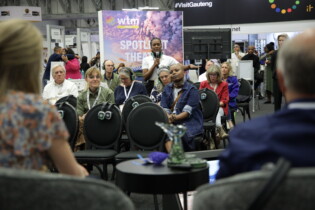This year, ibtm Africa, the leading African conference for the MICE sector (Meetings, Incentives, Conferences and Exhibitions), is running two sessions during Africa Travel Week Virtual. The first, titled ‘The future of business events: 2021 and beyond’, was held on 07 April, where the panel discussed the journey of Africa’s MICE sector, from pre-pandemic to now and looking into the future.
Prior to the global pandemic, the outlook for the business events sector was rosy. Anita Mendiratta, Founder & MD of ANITA MENDIRATTA & Associates and the moderator for this session, said the industry was delivering 3 to 5% growth year on year. Esmaré Steinhöfel, Regional Director for ICCA Africa, shared that several African nations had formed convention bureaus which were successfully bidding and securing contracts, and growing the appeal of destination Africa. Taubie Motlhabane, CEO of CTICC, revealed that the CTICC had projected revenue of R285 million for the 2019/2020 financial year. Tamlynne Wilton-Gurney, Chief Ideas Officer at idna, was also looking forward to a busy 2020 with 42 event bookings.
Prior to the global pandemic, the industry was delivering 3 to 5% growth year on year.
And then the pandemic struck. All growth stalled, and contracts were cancelled or postponed. idna could only deliver five of their 42 planned events, while the last three months of the CTICC’s financial year wiped out all profits from the previous nine months and left a deficit of 10%.
READ: What should the events industry expect & plan for in 2021?
Scrambling to survive, businesses in the MICE sector have had to reinvent themselves and their offerings. For example, the CTICC was transformed into a temporary hospital called the Hospital of Hope, to build the capacity of the healthcare sector during the first wave of infections. And many PCOs and event organisers have ventured into virtual and hybrid event formats. Mendiratta then led the discussion to explore what the sector can expect next.
Mendiratta: Now that we are more accustomed and used to meeting virtually, what does this mean for the future of business events?
Steinhöfel shared that the 59th ICCA Congress went ahead in Kaohsiung, Taiwan, but was supported by eight hybrid event hubs around the world – including the African one in Cape Town, while also streaming the event to virtual delegates. As a result, the event became more accessible and saw an almost 50% increase in attendance, securing close to 1 500 delegates as compared to an average of 1 000. She admitted that, as a result, ICCA will likely retain the hybrid format going forwards, but stressed that face-to-face is still a priority and that people will want to return to this way of doing business – especially when creating and nurturing new relationships.
“We’ve been in the shallow end of the 4th industrial revolution for a while now, and this forced us to go deeper.”
Wilton-Gurney argued a slightly different perspective, saying that the future will be hybrid, but we will get better at it. She pointed out that most of us will happily spend hours in front of screens and will feel emotionally engaged in the process. Therefore, connecting online isn’t a problem when hosting events, but rather how we present and manage online events needs refining. “We’ve been in the shallow end of the 4th industrial revolution for a while now, and this forced us to go deeper,” she says, adding that the hybrid model is so powerful because it gives attendees more choice, and allows events to reach wider audiences.
Mendiratta: Virtual events are an obvious avenue for organisers, but venues face a bigger challenge in that they have significant costs attached to maintaining a physical space. What can venues do to remain sustainable?
Motlhabane agreed that this is a huge problem, especially for large convention centres which have been designed to cater for mega events attracting up to 10 000 people. She argued, “We will never see those numbers again. Venues need to look at how to repurpose their space. They were all created when the idea ‘the bigger the better’ made sense. Now this is unsustainable. Not just in terms of attracting large crowds, but also in terms of the environmental impact of global travel and mega events. We need to find new ways to make money.”
Mendiratta: Throughout the pandemic, we’ve been required to prevent contact with others. How can we make people comfortable again with being in close contact with others?
Steinhöfel said that test events have been implemented to prove efficacy of our sector’s new health and safety protocols. She believes we need to continue to show this, and gradually she expects we will see the growth of events.
She added that Africa was one of the last regions of the world to be shut down by Covid-19. Because of this lag, we have been able to see the pandemic play out in other countries and can therefore anticipate what is likely to happen next locally. In this respect, it has been positive to see places like Dubai get 100% back to meetings.
It has been positive to see places like Dubai get 100% back to meetings.
Mendiratta agreed that the delay for business to return to pre-pandemic levels could be significant, highlighting that the International Air Transport Association (IATA) expects that air travel will only return to pre-pandemic levels by 2023/4.
Mendiratta: How do we attract event attendees and become financially viable, now?
Wilton-Gurney says that fear is driving a lot of people’s decisions, so the events industry needs to reassure its clients and consumers that they are safe. There are many ways to do this. For example, she suggested tiered attendee packages such as offering a premium indoor, in-person event with limited numbers, which is streamed to an outdoor audience at a lower cost, and which is also streamed to a virtual audience for an even lower ticket price. This gives attendees a lot of choice, so they can find the option they are most comfortable with.
She also noted that revenue can be achieved through creative sponsorship options. Many industries have done well during the pandemic, and they will be willing to spend money to help them build capacity or reach larger audiences.
Motlhabane added that venues cannot expect the same kind of revenue they were once able to earn. To be profitable, they need to create events that people want to attend in person, which are worth paying and travelling for. At the same time, they need to make sure the online experience is also good, so that virtual delegates do not feel cheated.
In closing, Mendiratta said the crisis will bring about a lot of change, from how venues operate to the purpose of events, and more. But what won’t change is the need we have to be together.
The second ibtm Africa session at Africa Travel Week is titled ‘Breathing life into events’ and will be held on 08 April 2021. Find out more at atwconnect.com.











